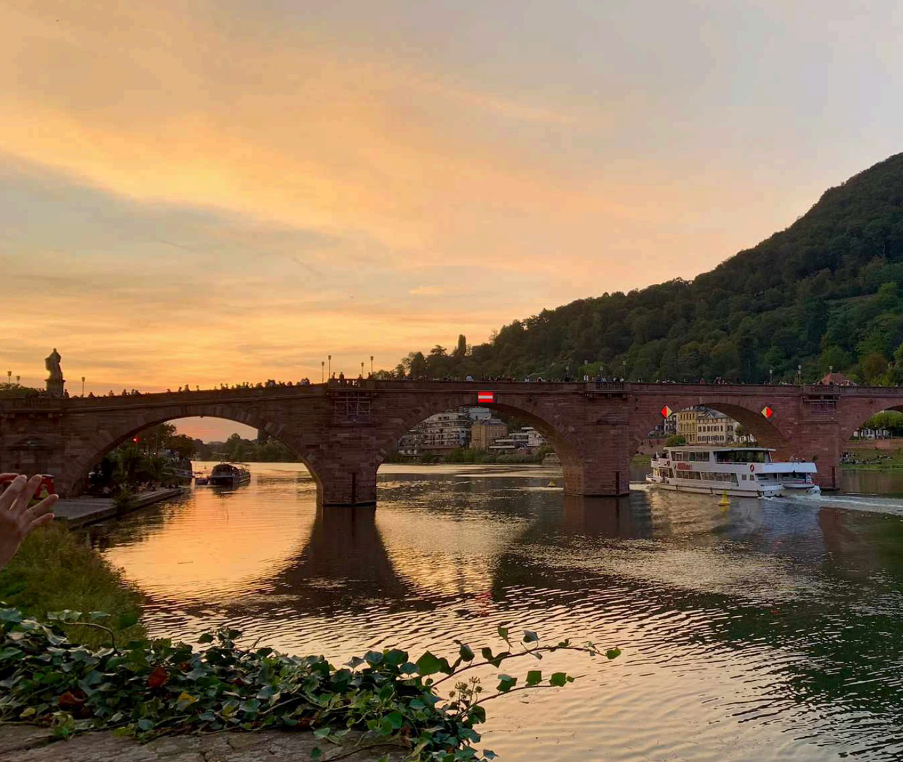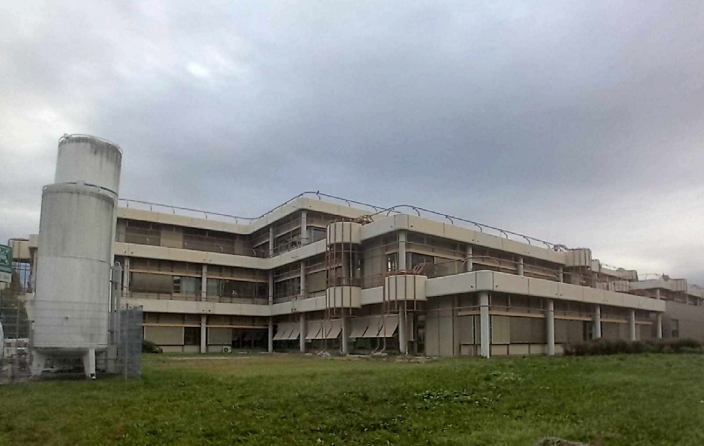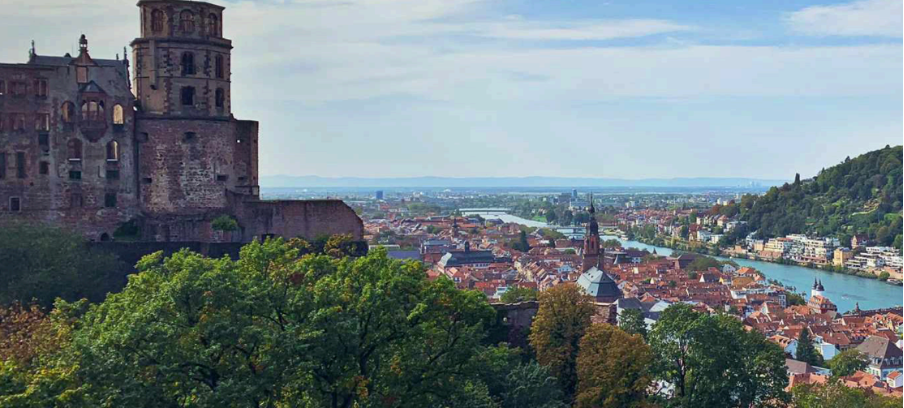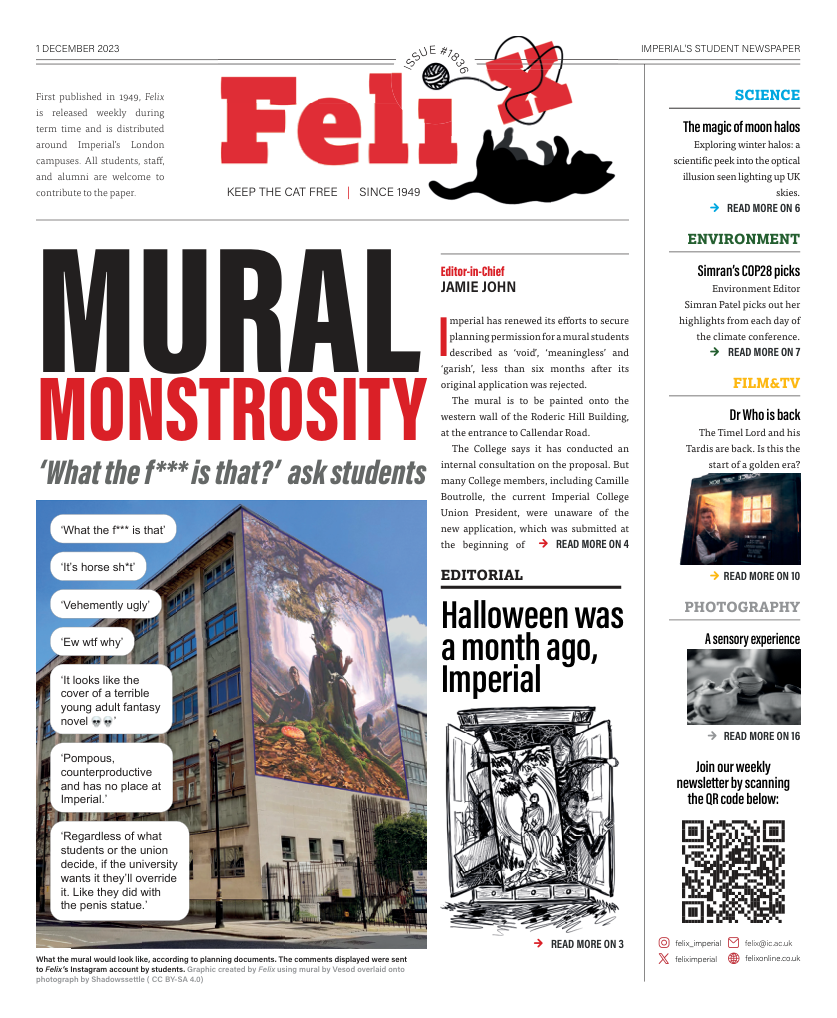Hallo Heidelberg, Hallo Hausmeister!
In a new collaboration with exchange student Evelyn, she introduces her newest home in the corner of Heidelberg.

The silvery flow of the Neckar river rushes by me as I look out the window of the number 24 tram as it crosses the Ernst-Walz Bridge. The air is still very warm for early October, the temperature closer to that of August or July. The view is pleasant, somewhat Seurat-esque as people relax on the grassy banks or cycle past. Everyone is soaking up the last few days of the summerlike weather. The Neckar River spans 362km from its source in the Black Forest to its meeting with the Rhein in Mannheim, and the city of Heidelberg, located in the Neckar Valley, is considered one of its most beautiful points. Even from my seat inside the scuffed tram, it is clear to see what drew the Romantics to this place.
I arrived in Heidelberg just under three weeks ago with a year of my life packed into a suitcase and a carry-on bag, brimming with excitement. I had been waiting for this moment for the last four years; the thought of it pushing me through the horrors of NMR lectures and one too many all-nighters at the campus library. I am not only one of the few foolish individuals who chose a Language for Science degree and has since stuck with it, but I have almost 10 years of German classes under my belt and a deep hatred of Leben des Galilei to prove it. I was looking forward to dazzling Baden-Württemberg with my mediocre German; I realise now that I couldn’t have been more wrong.
The city of Heidelberg is comprised of 15 districts, ranging from Rohrbach in the south, through the tourist-trap Altstadt (translated ‘old city’), to Handschuhsheim in the North. The area in which I am staying, Neuenheim, is situated north of the Neckar River, just below Handschuhsheim, and dominated by the sprawling science campus of the university on Neuenheimer Feld. It is here that a large portion of the student accommodation is located.

To picture Neuenheimer Feld is to imagine you are a science-fiction writer from the 1960s. It is tall, sterile and maze-like; a labyrinth of eco-brutalism and fenced off building sites. Imagine the setting of your favourite dystopian novel or zombie apocalypse movie and then add an alarming number of bikes and a very conveniently placed Aldi.
In one of four tower blocks near said Aldi is my two-person flat (or W-G as they are called here). Compared to the typical cupboards and box rooms which house the students of most London universities, my room here feels abnormally large, accommodating a carpet, a wardrobe, even a full-sized bookshelf. Fortunately, the tiny kitchenette, broken cupboards, black mould and general dirt keep it feeling like home. It was, however, these welcoming features so common to the tenants of London but unusual to those of Heidelberg, that led me to the final boss of basic conversational German: the Hausmeister.
The Hausmeister is the German’s answer to a hall supervisor or building manager, to whom, according to the tenant rules of my student accommodation, every new tenant must report their arrival. Ordinarily, this would be nothing more than a mental refresh of my Year 7 greetings class and a quick dict.cc search, but, unluckily for me, a damage report is also required.

As I descended the stairs towards the basement where the Hausmeister lurks, my chest began to bubble. No, this wasn’t just the standard social anxiety of an Imperial student, but rather the deep and gnawing fear of not being able to communicate. My B2/C1 level confidence had evaporated, leaving behind only words for describing immigration policy, classic German literature and, helpfully, fractal geometry. The education system seemed to have omitted any words pertaining to hygiene from my vocabulary, limiting me to ‘nicht sauber’ (not clean) and the word for hoover, Staubsauger (dust-sucker), which I had retained due to its amusingly literal translation.
Looking back on the event now, as Altstadt grows closer, it is easy to forget how terrified this single conversation made me feel. The Hausmeister, though kind enough, had English about as good as my German, meaning communication became a frustrating interpretive dance of badly broken German, over-exaggerated miming and Google Translate. Even though for anyone learning a second language, surviving such an experience should be considered a success, it is without doubt the scariest thing I have done in recent years.
The tram carriage fills with the gentle hubbub of vaguely familiar German and the sun is beginning to set over the forest covered slopes of the valley. I feel content, having recovered from my meeting with the Hausmeister and now with sufficient vocabulary to describe black mould. I am here in a beautiful city and working in a lab most students could only dream of. Now I know no matter how much I have to discuss British tea-drinking habits with curious Germans, or explain Brexit or ask stupid questions during lab, nothing will ever be as hard as that first conversation with the Hausmeister.Having managed that, I feel like I could do anything… maybe apart from talking to them again!










